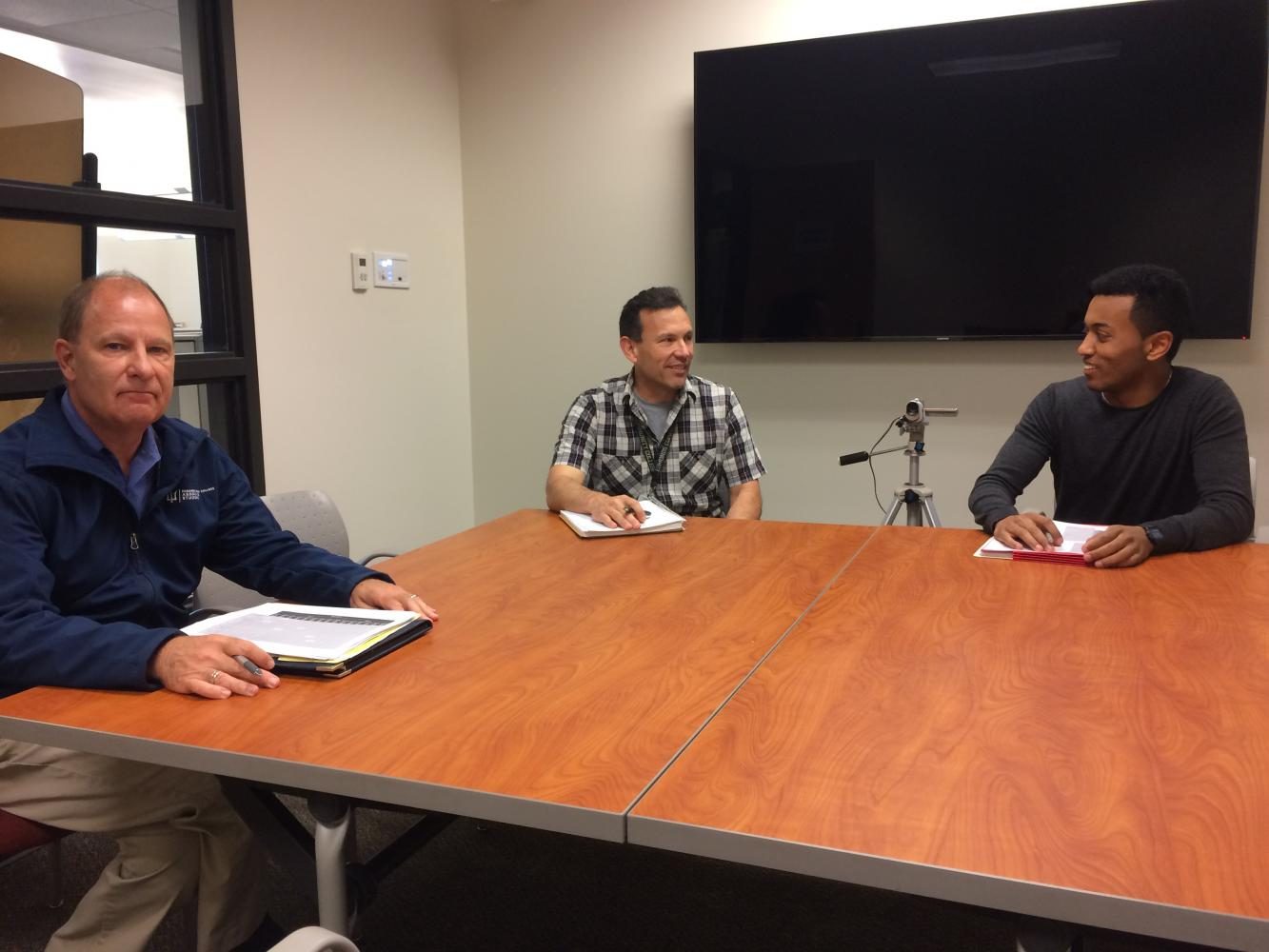FDA: The Fix and Dupe Administration
Director, VP, and Dean restrict access to student government meetings
Members of the executive officer committee convened on June 8, preparing to interview an executive board candidate. Naol Debele (right) and Jorge de la Torre (center) chat while Wayne Anthony (left) solemnly regrets cheeky grins and retorts of bygone days.
Note: The views and opinions expressed in this article are those of the author and do not necessarily reflect the official position of The Triton Review.
When I came back to school in the spring of 2014, I planned to obtain my Associate’s degree in a year and a half before moving on to university. I never foresaw staying at EdCC for twice that time.
The inclusive, compassionate campus centered on student success struck me. I wanted to get involved, leave my mark and pay back the gracious gifts of this community.
I started tutoring after my third quarter, and then writing for the newspaper. After I graduated last spring, journalism adviser Rob Harrill asked me to take over as editor-in-chief of The Triton Review. I accepted the position and have done my best to serve the student community at the college.
But I can’t stay here forever.
It is the duty of all students to pass the torch to their peers at EdCC regarding important issues. If you are passionate about an aspect of life on campus, you are responsible for igniting that spark in others and making sure part of our student culture isn’t snuffed out when you leave.
Before I go, I want to share information on two matters of critical importance. One involves our student Constitution, the other our Financial Code.
On the week of May 8, I exchanged correspondence with Wayne Anthony, the director of the Center for Student Engagement and Leadership (CSEL). Anthony also advises the executive officers in our student government and has sat in on our executive officer selection committee, which chooses our student government officers, since its inception.
I requested access to the selection committee’s meetings in order to write a story about the candidates and the process. Anthony denied The Review – as well as the student body – opportunities to observe the meetings.
I pressed Anthony with language from Washington’s Open Public Meetings Act (OPMA), which states that the meetings of any governing body’s committee with decision-making authority are open to the public. Anthony then referred to Arlene Anderson and Christina Castorena, respectively the college’s assistant attorney general (AAG) and vice president for student services, for advisement.
Two weeks later, Anthony had a firm answer for me. I sat down with him and Jorge de la Torre, dean for student life and development, on May 25 to hear the college’s official position.
Limiting his personal comments on the AAG’s interpretation, Anthony pointed to language in Article V of the Associated Students of Edmonds Community College (ASEdCC) Constitution.
“It does not define or direct the executive board members [student government] in any way, shape or form to have responsibility over that process,” he said. “[Anderson] doesn’t believe that this is a subcommittee of the executive board, and has no reporting responsibility in any way, shape or form.”
I found it somewhat bothersome that college administration lived in a world where our Constitution said the instrument used to select student government is not responsible to the student body.
When asked who the selection committee derives their decision-making authority from, Anthony responded: “You can read the Constitution, so I’ll let you do that.”
I’d already consulted the Constitution about the source of the committee’s authority. Section I of Article V reads, “Executive Board members shall be selected through an application review process. The Selection Committee shall be comprised of: four student representatives, one faculty member appointed by the College Vice-President for Instruction, one administrator appointed by the College President and the Director for Student Programs.”
Note the Article stipulates how the staff and faculty members of the committee will be selected, but fails to detail by what process student representatives are selected. This lack of detail is what Anderson based her interpretation on.
If the Constitution simply elaborated on the current process – that those student representatives are selected by the executive board to operate on behalf of them – then the selection committee would definitely be considered a subcommittee of student government and subject to the OPMA. Even though the selection committee was a subcommittee of student government in practice, administration was willing to keep students out of the selection process because our Constitution wasn’t clear enough to preserve that sacred right.
“Administration illegally and willfully refused public access to student government subcommittee meetings subject to the OPMA.”
At this point, I could no longer stand by as an impartial member of the press. My civic duty as member of the Associated Students prevailed against my obligation to simply observe and report.
On May 26, I sat down with Maria French and Farheen Saleem, the executive officers of diversity and community relations, in order to explain the lack of clarity in Article V of the Constitution. Working together, we drafted a position statement to interpret the intent of Article V and ensure students maintain control of their government’s selection.
I presented the position statement at a work session of the executive board on May 30, explaining the importance of including in the Constitution the process by which our executive officers are selected.
Matt Nguyen, communications assistant to the executive board, remarked that this was not the first time this year they had wrestled with administration for control of student affairs.
The executive board voted to consider taking a position on the issue once they had done enough independent research and drafted their own version of the position statement.
On Friday, June 2, the executive board adopted a position statement, clarifying that student representatives on the selection committee are picked by student government, and that the selection committee is in fact a subcommittee of student government and therefore subject to the OPMA.
Immediately following the meeting, I inquired with Anthony in person and electronically as to this year’s selection committee’s plan to open the meetings to the public. Anthony stated that since this year’s selection committee was put together before the adoption of the position statement, it would not be considered a subcommittee of student government.
Keep in mind, no changes were made to the process of putting together the selection committee. Those processes were simply defined in the interpretation of the Constitution via the position statement approved by the same student government who put together this year’s selection committee.
So, that’s our first issue: Administration illegally and willfully refused public access to student government subcommittee meetings subject to the OPMA. To current and future students of EdCC, make sure in coming years that the student government selection committee remains under our control, free from the prying grasp of administration.
On to the second topic at hand, the administrative attempt to pay staff salaries with student fees.
In December of 2016, Castorena (the aforementioned VP of student services) submitted a proposal to student government. The proposal asked student government to take action and revise our Financial Code, allowing professional college staff working in student programs to be paid with dollars from our Services and Activities (S&A) fees.
S&A fees come directly from student payments. They are additional per-credit fees the college charges students as part of tuition. For the 2016-17 academic year, a full-time student paid anywhere from $118 to $155 in S&A fees every quarter. These fees go towards paying student employees, childcare, athletics, music, the game room, this very newspaper and other student-centered services.
Castorena sought this revision in order to hire an associate director for the expanding Diversity Student Center (DSC). According to her memorandum, “The current CSEL structure does not provide for adequate management of a million dollar facility destined to serve as the student diversity, equity and inclusion hub of the campus.”
Castorena went on to recommend the Financial Code be reviewed and revised first, and later meet to discuss the needs of staffing the new DSC.
So, an administrator is suggesting our executive board make changes to the student Financial Code first, and talk about the impact and gravity of such a decision later? Signal the red flags and warning bells.
The executive board did not take immediate action on the issue, while administration continued to preen and clarify the associate director position. It would not be brought up again until May 23, when Dean de la Torre requested $78,556 in annual funding from the executive board to pay for the associate director’s salary and benefits out of the students’ S&A fees.
Diana Bustos is the current program manager of the DSC, and is well-loved by the many student employees who work under her supervision. The duties and responsibilities of the new associate director position overlap almost entirely with Bustos’ existing position.
Therein lies the problem. Despite the DSC’s expansion into a larger space, there are no documented plans for new services and programs that would require an additional employee with the expertise of an associate director.
The closest de la Torre came to providing evidence of the need for an associate director of the DSC is as follows: “It makes sense that the expanded DSC will require much more programming and student engagement to become what it was intended – a source of pride and a dynamic center of diversity and inclusion.”
The problem is, spending S&A fees on a position the college already pays for doesn’t make sense for students. It only makes sense for administration, especially given the recent budget crunch caused by falling enrollment.
Analyze de la Torre and Castorena’s language – referencing the “destiny” and “pride” of the remodeled DSC. Was the intent of this proposal to introduce a reasonable amendment to our Financial Code, or to stroke the ego of administrators while saving them tens of thousands of dollars at the expense of students?
What’s more, administration failed to notify Bustos – who currently performs duties assigned to the proposed assistant director – and DSC student staff of their plan. In fact, de la Torre made his May 23 proposal just three days before Bustos left on a two-and-a-half-week family medical leave.
Executive Officer French conducted research on the necessity of the new associate director position. She consulted with Lia Andrews, who served on last year’s executive board. Andrews stated that although last year’s board approved expenditures to expand the square footage of the DSC, they had no intention of implementing additional services or hiring more staff.
On May 30, student staffers of the DSC attended a work session of the executive board, expressing their distaste and dissatisfaction with the way the proposal had been handled.
Later in the meeting, de la Torre announced that the administration decided to withdraw the proposal to fund a DSC associate director position with student S&A fees.
Let’s not forget the language of Castorena’s original request: that the Financial Code be amended to allow staff in student programs to be paid by S&A fees. This is a slippery slope that may not stop at one employee.
Once that exception is adopted, what is stopping all CSEL staff from being paid with S&A fees? Surely administration is aware of the money they could save by getting student government to adopt this policy.
Exceptions to pay for certain professional staff already exist within the Financial Code. For the 2015-16 fiscal year, salaries accounted for over $447,000 of just under $1.4 million in expenditures, or about 32 percent of all S&A fees spent last year. The proposed DSC associate director position alone would have increased salary expenditures by 19 percent.
Section 7 of our Financial Code states, “Salaries of professional employees in tenurable positions, administrative exempt personnel, permanent classified, civil service employees and stipend employees should not be paid from service and activities fee revenue.”
Limitations like this exist to protect S&A fees from unlawful and unethical use. If the floodgates in the Financial Code are torn asunder by administrative recommendations to an inattentive student government, there is no telling how many hundreds of thousands of dollars could be siphoned away from S&A fees to pay for professional staff salaries in student programs.
It should be no surprise: When administrators have an agenda that chips away at student rights and authority, they lie in wait until an executive board comes along that will, either out of inexperience or a willingness to please their supervisors, play into their plans.
The most alarming piece of this puzzle is the administration’s attempts to weaken the control we Associated Students have in maintaining the selection of our own government. After all, if Wayne Anthony can deliberately control which students are selected for the executive board and eschew public oversight, why wouldn’t he pick candidates who would be complicit towards his means and objectives?
But this story isn’t about administration. It’s about our duty as students to participate in our government and to pass on information surrounding important issues, so administrators can’t turn to feast on the trusting and unwitting students we leave behind when we graduate and move on.
If the thought of administration illegally shutting you out of the student government selection committee meetings bothers you, attend the meetings and let your voice be heard. It is your right to do so. Ask yourself if you feel like you get $150 of services and activities at the end every quarter – you’re paying for them. Hold student government accountable, because we hardly have a hand in selecting who represents us.
I, Thomas Fairchild, pass the torch of awareness on to you. In the coming years, expect administration to circle back to these issues and more once our memories have faded. Expect them to find new and creative ways to bend and manipulate student government to their advantage – at the cost of student rights and their own integrity.
I urge you to make good on your responsibilities as a student by passing on these stories and lessons you have learned at EdCC to the incoming class of students. After all, you won’t be here forever, either.
Continuing developments as of June 13, 2017 @ 8:50 a.m.: At yesterday’s final executive officer selection committee meeting, Director Wayne Anthony refused to let EdCC student Kiddus Afeworki attend and observe the proceedings, a violation of RCW 42.30.030 of the OPMA. Anthony has not responded to requests for comment.
The selection committee made final action in choosing next year’s executive officers, and are waiting on confirmation of the candidates before releasing their names. Their decisions, however, may be considered null and void according to RCW 42.30.060 because they refused public access to the meeting.
The Triton Review has requested a full disclosure of relationships between the candidates and the selection committee members.
Revision as of April 4, 2017 @ 2:26 pm: Article and secondary headline was revised to remove unnecessary comments which reflected the author’s personal negative opinions of Wayne Anthony.




